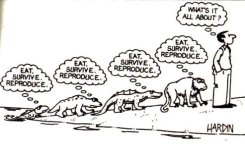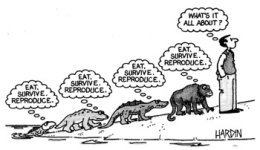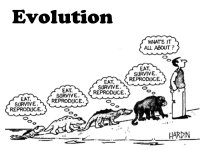The idea that someone can be 'neurotypical' is something that I've been thinking about for a while now. Years ago there was a time when I wondered if I had something resembling high functioning autism, before later learning that the 'high functioning' label isn't really a good way to look at how someone's mind works.
Now, after a few more years of learning about the mind and psychology this has only raised more questions for me. The most important of which is:
- why is being neuro-typical something that is prised?
Consider that people are essentially products of evolution and that their biological purpose is to survive and reproduce. We should expect then, that the people we call 'normal' are those who are most likely to produce children. These are the people who are cunning enough to make money, to find partners, who want to produce children. These are people that, most generally, are better able to manipulate their environment in order to amass resources for themselves.
So both culture and psychology to this point in history have normalised the idea that if you're not good at producing children and making money you're a failure. This is embedded in the way that we define psychiatric conditions. Someone who experiences the world differently, whose genetics result in a different outlook on the world, someone who isn't a part of the majority is 'maldapted', 'sick'. Someone who has five children and no social defects is 'neuro-typical'.
And this is where we get into the grey, philosophical part of the problem.
Ok, maybe what's 'normal' is set by the majority, and so those on the fringes are usually forced to adapt. But at the same time, by the strict definition of being neuro-typical there are a lot of really shitty people who could be labelled that way. CEOs laying off workers from their company? Neuro-typical. Men lying to their partners and neglecting their children? Neuro-typical. World leaders wreaking havoc? Neuro-typical.
The purpose of a person is to capitalise. To win resources for themselves in the context of their environment. And so those who are the most adapted to the world aren't necessarily empathetic, they aren't necessarily smart, they might not necessarily be great people, they're those with the ability to capitalise on the world around them.
And so philosophically, I don't see a reason to prize the fact that one meets some transient definition of 'normal'.
Now, after a few more years of learning about the mind and psychology this has only raised more questions for me. The most important of which is:
- why is being neuro-typical something that is prised?
Consider that people are essentially products of evolution and that their biological purpose is to survive and reproduce. We should expect then, that the people we call 'normal' are those who are most likely to produce children. These are the people who are cunning enough to make money, to find partners, who want to produce children. These are people that, most generally, are better able to manipulate their environment in order to amass resources for themselves.
So both culture and psychology to this point in history have normalised the idea that if you're not good at producing children and making money you're a failure. This is embedded in the way that we define psychiatric conditions. Someone who experiences the world differently, whose genetics result in a different outlook on the world, someone who isn't a part of the majority is 'maldapted', 'sick'. Someone who has five children and no social defects is 'neuro-typical'.
And this is where we get into the grey, philosophical part of the problem.
Ok, maybe what's 'normal' is set by the majority, and so those on the fringes are usually forced to adapt. But at the same time, by the strict definition of being neuro-typical there are a lot of really shitty people who could be labelled that way. CEOs laying off workers from their company? Neuro-typical. Men lying to their partners and neglecting their children? Neuro-typical. World leaders wreaking havoc? Neuro-typical.
The purpose of a person is to capitalise. To win resources for themselves in the context of their environment. And so those who are the most adapted to the world aren't necessarily empathetic, they aren't necessarily smart, they might not necessarily be great people, they're those with the ability to capitalise on the world around them.
And so philosophically, I don't see a reason to prize the fact that one meets some transient definition of 'normal'.



